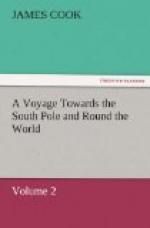Thus far Mr Burney’s report; and to complete the account of this tragical transaction, it may not be unnecessary to mention, that the people in the cutter were Mr Rowe, Mr Woodhouse, Francis Murphy, quarter-master; William Facey, Thomas Hill, Michael Bell, and Edward Jones, fore-castle men; John Cavanaugh, and Thomas Milton, belonging to the after-guard; and James Sevilley, the captain’s man, being ten in all. Most of these were of our very best seamen, the stoutest and most healthy people in the ship. Mr Burney’s party brought on board two hands, one belonging to Mr Rowe, known by a hurt he had received on it; the other to Thomas Hill, as before-mentioned; and the head of the captain’s servant. These, with more of the remains, were tied in a hammock, and thrown over-board, with ballast and shot sufficient to sink it. None of their arms nor cloaths were found, except part of a pair of trowsers, a frock, and six shoes, no two of them being fellows.
I am not inclined to think this was any premeditated plan of these savages; for, the morning Mr Rowe left the ship, he met two canoes, which came down and staid all the fore-noon in Ship Cove. It might probably happen from some quarrel which was decided on the spot, or the fairness of the opportunity might tempt them, our people being so incautious, and thinking themselves too secure. Another thing which encouraged the New Zealanders, was, they were sensible that a gun was not infallible, that they sometimes missed, and that, when discharged, they must be loaded before they could be used again, which time they knew how to take advantage of. After their success, I imagine there was a general meeting on the east side of the sound. The Indians of Shag Cove were there; this we knew by a cock which was in one of the canoes, and by a long single canoe, which some of our people had seen four days before in Shag Cove, where they had been with Mr Rowe in the cutter.
We were detained in the Sound by contrary winds four days after this melancholy affair happened, during which time we saw none of the inhabitants. What is very remarkable, I had been several times up in the same cove with Captain Cook, and never saw the least sign of an inhabitant, except some deserted towns, which appeared as if they had not been occupied for several years; and yet, when Mr Burney entered the cove, he was of opinion there could not be less than fifteen hundred or two thousand people. I doubt not, had they been apprized of his coming, they would have attacked him. From these considerations, I thought it imprudent to send a boat up again; as we were convinced there was not the least probability of any of our people being alive.




